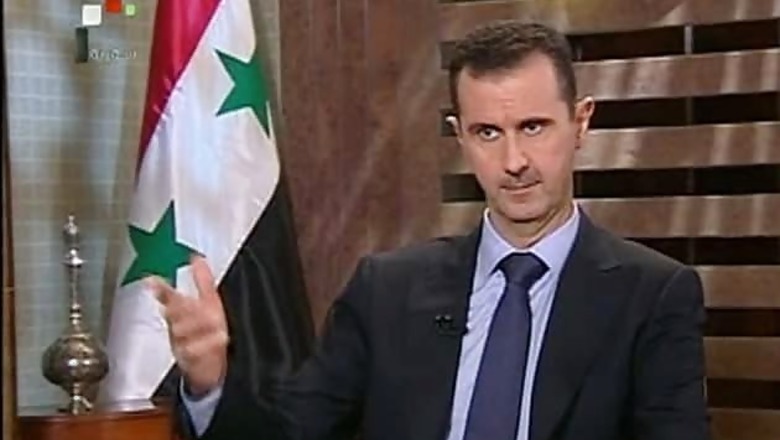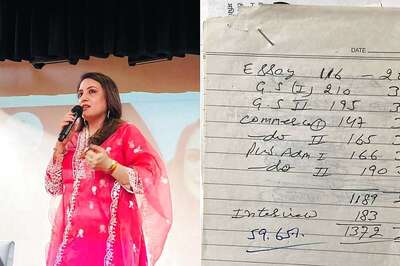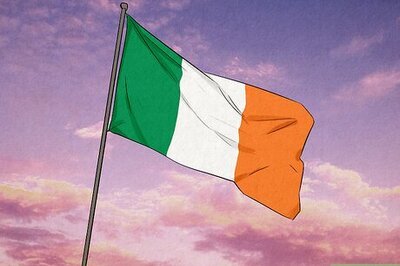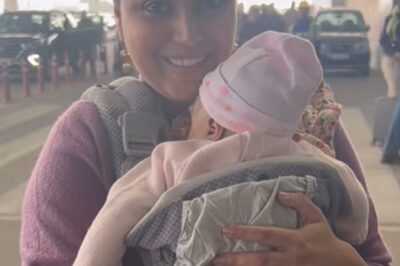
views
Beirut: Syrian President Bashar al-Assad on Thursday said that he was confident of victory against rebels and made a symbolic visit to a town once overrun by insurgents and now mostly retaken by his army. But Assad's forces took a blow in the central city of Homs, where at least 40 people were killed in a huge explosion that hit a weapons cache and in mortar attacks on mainly Alawite districts, the same minority sect as Assad, and guarded by pro-Assad militia, opposition activists said.
Loyalists retaliated by bombarding the northwestern district of al-Waer, killing 22 people, mostly civilians. Tens of thousands of Sunni Muslim refugees had taken refuge at al-Waer, fleeing bombardment by Assad's forces on rebellious Sunni neigbourhoods in the centre of Homs, they said.
Assad's visit to the battered town of Daraya, southwest of Damascus, and a defiant speech illustrate the confidence of a president who is taking the upper hand in a conflict two years after many Syrians believed he was about to be toppled.
"If we were not sure that we were going to win in Syria, we would not have the ability to resist and the ability to continue fighting for more than two years against the enemy," Assad was quoted as saying by state news agency SANA.
Insurgents have seized large swathes of territory, but Assad's forces have staged a counter-offensive in recent weeks, pushing them back from around the capital Damascus and retaking several towns near the border with Lebanon.
Assad has framed the revolt against four decades of his family's rule as a foreign-backed conspiracy fought by Islamist "terrorists". When pro-democracy protests started in March 2011, a military crackdown eventually led to an armed insurrection.
Rebels have used bombs and mortars to hit government-controlled areas where they are unable to push in with infantry. In Homs, video posted on the Internet by opposition activists showed an explosion blasting a fireball hundreds of metres into the air.
Residents in the area said the explosion in Wadi a-Dhahab was a rebel attack on a weapons cache. One said the sound of multiple explosions could be heard for over an hour as munitions were detonated. The Syrian Observatory for Human Rights, an anti-Assad monitoring group, said the blast killed at least 40 soldiers and civilians and left 120 wounded, some in a critical condition.
Rebel sources in Homs said the attack was caused by a surface-to-surface "Grad" missile. They would not say which rebel group fired it. Reuters cannot independently verify reports from Syria due to severe reporting and security restrictions.
U.N. investigators say Assad's forces have carried out war crimes including unlawful killing, torture, sexual violence, indiscriminate attacks and pillaging in what appears to be a state-directed policy. They say rebels have also committed war crimes, including executions, but on a lesser scale.
Both sides accuse the other of using chemical weapons and - after months of diplomatic wrangling between the United Nations and Damascus over access - a chemical weapons investigation team will visit three sites where alleged attacks have occurred, the United Nations said on Wednesday.
One attack in the northern town of Khan al-Assal was in March and samples of Sarin gas - a fast-acting nerve agent that was originally developed in 1938 in Germany as a pesticide - can degrade very quickly, within weeks. Rebels also seized Khan al-Assal from Assad's forces last week so access to the site could be difficult from the government side. There is still fighting in the area.
At best, weapons inspectors will determine scientifically whether banned chemical agents were used in the 28-month-old conflict, and not who used them, according to the Organisation for the Prohibition of Chemical Weapons (OPCW), which works with the United Nations on inspections.
Members of the 15-person team assembled by U.N. Secretary-General Ban Ki-moon had been on standby in Cyprus since April but went to Turkey to gather evidence. The U.N. chemical weapons experts cannot enter Syria without the government's permission.
In a statement published in the official army magazine to mark the 68th anniversary of the Syrian army's creation, Assad said soldiers had shown "courage in the face of terrorism and the fiercest barbaric war in modern history".
A picture posted on the presidency's Facebook page showed Assad, in a suit, shaking hand with a soldier in army fatigues and a helmet. Behind them was a scene of war; wires hanging from electricity pylons near an apartment block damaged by an explosion. No civilians could be seen.
The army targeted Daraya with artillery after rebels moved into the area last year. It has since been able to retake parts of the town but at the expense of widespread material damage and many civilian casualties, according to residents.
The struggle in Syria has become markedly sectarian, broadly pitting majority Sunni Muslim rebels against Assad's minority Alawite sect, which is an offshoot of Shi'ite Islam.
Nine European Union nations urged the European Parliament on Thursday to back plans for an EU-wide passenger data list aimed at thwarting suspected militants travelling from Europe to fight in Syria, fearing they will return to home to carry out attacks in Europe.
####UN, have alleged Assad’s forces of carrying out war crimes as a state-directed policy.




















Comments
0 comment